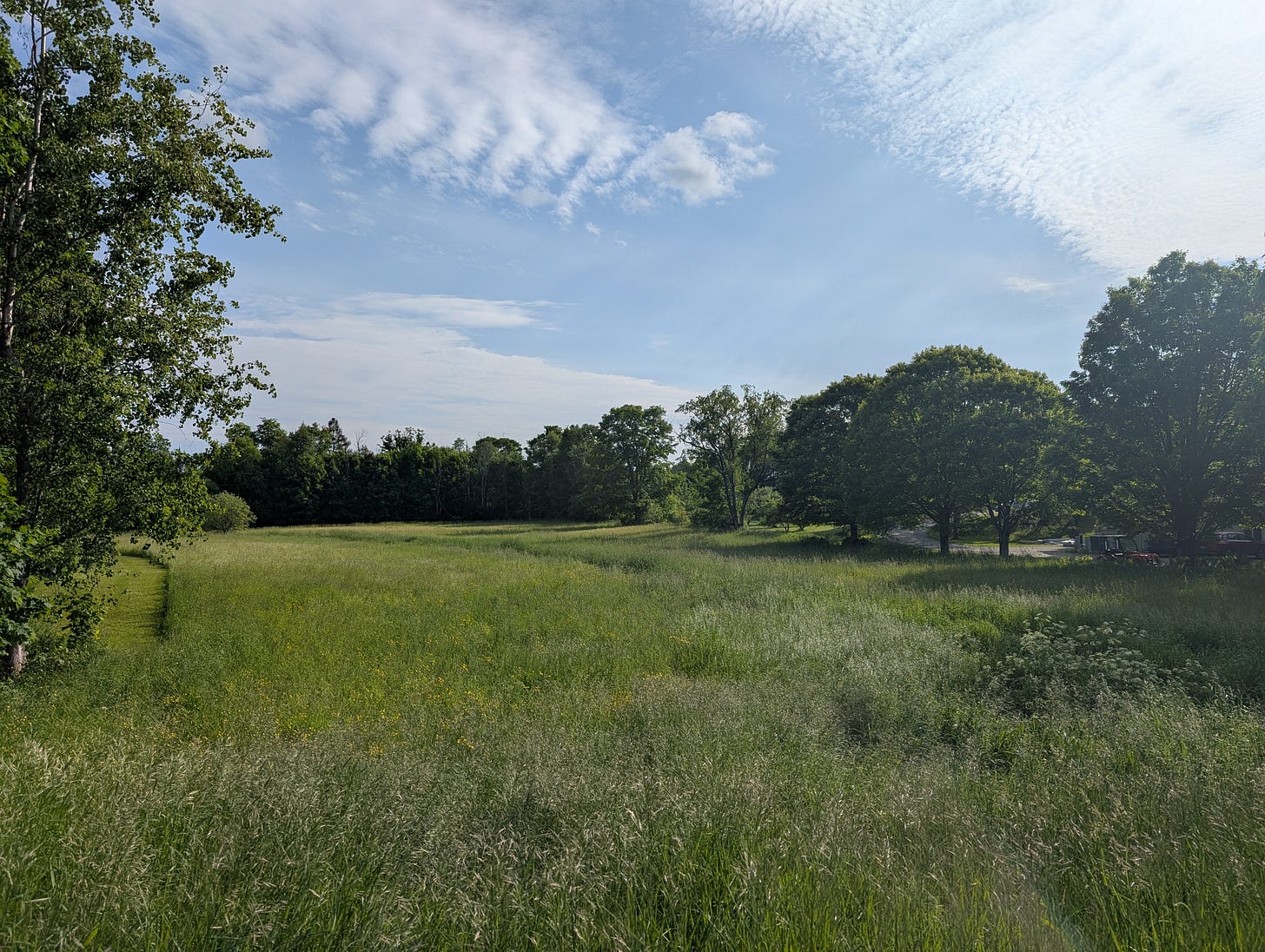The Love That Is Not For Itself
Trinity Sunday
We boast also in our afflictions, knowing that affliction produces endurance, and endurance produces character, and character produces hope, and hope does not put us to shame, because God's love has been poured into our hearts through the Holy Spirit that has been given to us.
Romans 5:3b-5
I’m getting married, so this is my last sermon as a bachelor. I'm excited about it for a lot of different reasons, and I’m grateful for it for a lot of different reasons. It's a little surreal in the best way.
I've been curious about how this new official role—husband—will change things in my life. On one level, it doesn’t seem like it could change the love I’ve built and grown in together with my fiancée. But on the other hand, it changes everything, right? How could it not? It at least makes it official, before God and the state, that I am no longer to live for myself. But it’s still a mystery to me how this will inform and change the rest of my life and the rest of my other relationships.
I know that becoming ordained as a pastor changed everything with my relationships. I had obviously already been a Christian, so it wasn’t that the moment of ordination magically transformed me, but it did establish officially, for God and the Church, that I was no longer to live for myself. It didn’t make me enlightened, it didn’t make me stop being a sinner; people who know me know better than that. But the past two years in that role have shaped all my other relationships in my life, and it’s deeply enriched me in learning from all the love of those in our church.
I know you’ve had your own relational transformations too. Those moments in your life that didn’t just give you more papers to sign and things to do, but began expressing all these other sides of yourself that had been a mystery to yourself, where you also knew that you had to stop living for yourself.
On this Trinity Sunday, we live into the mystery of a God whose very being is to not live for himself. The Father lives for the Son through the Spirit, and the Son lives for the Father through the Spirit, and the Spirit lives for the Father and the Son, because God’s very being is not existing for the sake of himself, but for the Other. His very being is giving life beyond himself to us; to you.
Every now and then, Trinity Sunday falls on Father’s Day, like today, which is, I suppose, only one-third of a perfect coincidence. I know many of you fathers must have felt what it means to have one of your relationships transform all the other parts. You might have already been a son and a brother, but that day you became a father, I can only imagine how it changed your understanding of what it means to be a son or a brother. And of course, the same goes for our mothers, daughters, and sisters. Each role enriches and informs the other.
We all know that love has so many sides and dimensions to it. Giving love, receiving love, and the music of love that ties it all together is so complex. The same is true in the painful expression of love with grief and tragedy. When something truly tragic happens, it's technically only one event, but there are so many different sides and dimensions of pain and loss, because there are so many facets of broken relationships and hurting love.
Often we, in our limitation, can only experience one side of love at a time. We intimately know a tragedy from our side, but not other sides. We intimately know love through one role—father, son, brother—but for one reason or another, maybe we don’t really know all all the other sides of that love, or don’t equally know them. I personally don’t know what it means to be a husband or a father right now. I can only imagine. None of us knows fully what it’s like to be all the different sides of love in the world. Of course not.
But miraculously, and mysteriously, God does.
The Trinity is still a mystery, the Early Church’s best description of the love they had just witnessed, hands lifted to the heavens as if we could possibly hold the whole universe. And ever since we’ve tried to give all these analogies and examples to grasp it; none are perfect. We often understand only one part at a time.
You might be out in nature, overwhelmed by its beauty and power, and in that moment, feel God as Creator, as Father, as the ultimate Source. In moments of profound pain and suffering and fear, you might connect most intimately with Jesus, the one who truly knows what it means to be human, the one who walked among us and wept with us. Or maybe you find yourself having a moving worship experience, or just a quiet, almost silent presence of the Holy Spirit. And the good news is that if you have a relationship with one of these persons of God, you are brought into a relationship with all of God, all in all.
What we can only experience imperfectly, God embodies perfectly. And when we speak of the Trinity—Father, Son, and Holy Spirit—we're not talking about three separate gods, but three “sides” or dimensions of one eternal, boundless love. God is not merely a giver or a receiver of love; God is love itself. And God didn’t just learn what it was like to have these different loves; God has always been all of this love all at once.
We live in linear time, and we know that we often develop as people in a progression. We learn things. We grow. Or conversely, we lose things. We forget. In contrast to us humans, there's a beautiful rabbinical saying, “There's no early or late in the Torah.” Meaning, Scripture all is timeless together, arises together, and there is no older or younger Scripture in God’s eyes, it's all a timeless thing—his Teaching, his Law, his Word, it’s all been all together all at once, even if we experience it in part in a certain order, just like we read the Bible in a certain order. The same can be said of God's very being.
God becoming Christ wasn't a linear development, as if God suddenly changed one Christmas morning. Instead, it was an expression in time of something out of time about his relationship with us, of who he always was. From our perspective, Jesus was in time, and so God’s expression of his love in Jesus Christ then helped us make sense of the past, the present, and the future. So, then, throughout all of Scripture, we say Christ was present in it all, and so too was the Spirit present in all, even if they hadn’t been “sent” in linear time yet. In Christ, the Father showed us that he truly understood what it meant to be human, to suffer, to love in a way we could grasp. And in the Spirit, we know God was quietly at work the whole time, and always will be. We are not orphaned.
And in the Trinity—the God whose very nature is a God who does not live for himself, but lives for others—we see the fullness of life and love primarily through relationship. And we learn that life is not meant to be lived for ourselves.
That is the basic call, the “what now?” of the Trinity. The Trinity may seem like such a distant, theological, heady thing to think about or debate, and you may not really know what to do with it. So what do we do with the Trinity? If nothing else, we remember that our lives are not meant to be lived for ourselves. Love is only love when it is not for itself.
So just as I am stepping into a marriage that I pray will move me more and more out of myself into life partnership, we are also invited to let the Triune God transform us in all of our relationships. The Church itself is called “the bride of Christ,” meaning we are called to be partnered with Christ, transformed by living for the living Christ, who then wants us to love his Father’s world in the Spirit. We are invited to be reshaped by his love that loves not for himself but for us so that we can be transformed in all our relationships—as spouses, fathers and mothers, children, friends, neighbors—knowing that we are not to live for ourselves, for love cannot love for itself.
Instead, we are called to love each other by living for each other; just a fraction of a reflection of the Father, Son, and Holy Spirit, the God who lives and loves not for himself, but for you. Amen.






